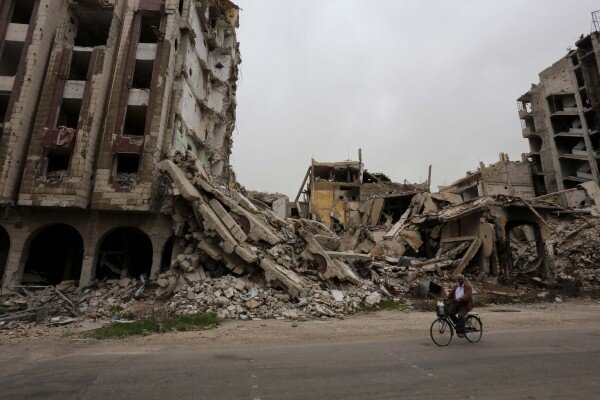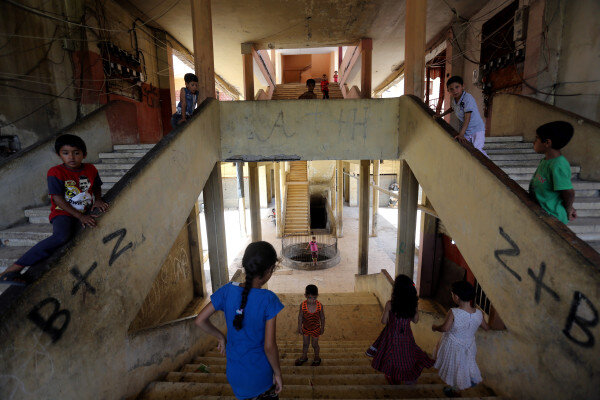Middle East
This photo essay highlights the cultural beauty and contradictions of Syria against the backdrop of its civil war and ongoing political turmoil. The photos tell a story of how ruins lie in the fractured bonds of community.
Soumya Chaturvedi argues that the signing of the IMEC MoU at the G20 Summit aims to foster connectivity between India, the Middle East, and Europe, while strategically diversifying economic relations away from China's BRI influence.
Although social movements in Israel and the occupied Palestinian territories (oPt) differ in methodology, strategy, and an understanding of the cost necessary to accomplish peace, many still share the common goal of bringing an end to the Israeli-Palestinian conflict. Rev. Dr. Mae Elise Cannon and Kevin Vollrath examine how these movements define the core issues of the conflict.
How can governments and funders combat the global education crisis caused by the COVID-19 pandemic? Piper O’Keefe argues that the key is to invest more resources in teachers—not simply ask more of them.
The "Government of Change'' provides a few promising opportunities, explains Gal Komem.
Scholars are still building a picture of life under the “caliphate“. Mathilde Becker Aarseth’s Mosul under ISIS adds to our understanding, writes Anjana Nair.
Adityamohan Tantravahi argues the U.S. decision to engage the Taliban jeopardizes U.S. security interests. Instead, the United States should support a multi-ethnic coalition to negotiate with the Taliban itself.
Sheridan Gunderson explains the origins of the Israeli West Bank barrier and the art the adorns it.
Andrew Doris explains why analogies to peacetime garrisons understate the costs of the Afghanistan intervention.
Lebanon’s system of impunity started with the 1991 General Amnesty. Ryan Saadeh explains how.
By Anoush Baghdassarian and Sherin Zadah
The authors shed light on crimes committed against the predominantly Kurdish community in Afrin, Syria.
By Matt Trevithick
Staffan de Mistura, an Italian-Swedish diplomat with a 40-year career in the United Nations, last served as the UN Special Envoy for Syria from 2014 to 2018. He sat down with Executive Editor Matt Trevithick of the Yale Journal of International Affairs shortly after President Trump’s announcement of a withdrawal of US forces from Syria in October 2019.
By Loren Voss
There is a startling similarity across the globe in the language politicians and media organizations use to describe people fleeing for their lives. In response to a growing number of desperate and displaced people, the rhetoric coming from governments and newspapers is largely the same—these “others” threaten our beloved nation—letting them in would destroy its very foundation.
By Amy Fallas
During an address delivered to attendees of the World Summit in Defense of Persecuted Christians in May 2017, Vice President Mike Pence declared that “no people of faith today face greater hostilities or hatred like those who follow Christ.”
By Shravan Bhat
In Jerusalem, a start-up called Energiya Global is designing solar energy projects in sub-Saharan Africa. Life in the colourful little company is a respite from “the conflict” that looms large over every dinner table conversation, every water-cooler chat, and every falafel line in Israel.
By Behbod Negahban
Analysts commonly depict Iran’s Supreme Leader, Ali Khamenei, as the prime mover behind the Islamic Republic’s foreign policy. This paper will challenge this view, arguing that the IRGC both pressures and enables the Supreme Leader to adopt hard-line policies through its influence on three aspects of the regime.
By Marwan Tahtah
In the alleys of Homs in Western Syria, my camera looks for what’s left of the city and struggles to find any remnants. On the sidewalk lies a stray cat that does not let out a sound. It drags its memories of destruction and hides behind one of the buildings reduced to rubble. The smell of war and the deafening silence of its aftermath pervade.
By Marwan Tahtah
The Syrian Civil War has seen more than 4.8 million refugees flee the country, with 1.1 million now living in neighboring Lebanon.
By Kevjn Lim
Many intelligence agencies were caught off guard by the Arab Spring in 2011. Similarly, many agencies failed to anticipate the Islamic State taking over Mosul in 2014. Yet, the reasons behind these instances of strategic surprise weren’t new at all. They were already apparent over 25 years before prior to the Iranian Revolution, and still pervade contemporary intelligence work.
By Ariya Hagh and Peyman Majidzadeh
“Dear citizens! Attention please, attention please: Tehran is now free.” Such was the content of an anonymous message widely shared on the messaging app Telegram in the immediate aftermath of the 2016 elections in Iran.
By Sven-Eric Fikenscher
For the time being, JCPOA-related restrictions will keep Iran relatively far away from the nuclear weapons option, but Iran could undermine those restraints by cheating. U.S. policy vis-à-vis Iran should be informed by the likelihood that cheating takes place and should endeavor to decrease whatever incentive Iran might have to cheat.
An Interview with Ambassador Dennis Ross
Yale Journal of International Affairs (YJIA) caught up with the president’s former Middle East expert, Dennis Ross, to understand why Kerry’s shuttle diplomacy reached an impasse.
By Mina Al-Oraibi
Ten years ago today, 9.7 million Iraqis ignored the naysayers and, braving threats of violence and bombs, voted in a referendum on their new constitution.
By Juan Zero
On August 27, 2015, seventy-one refugees were found to have suffocated to death in a frozen food truck that was abandoned on the Austria-Hungary border.
By Jack Miller
Since the late 1990s, a comprehensive discussion relating to changes in the nature of warfare and the military development of conventional state actors has been progressing in U.S. policy circles.
By Todd Robinson, Paul F. Diehl, and Tyler Pack
The apparent use of chemical weapons by the Assad regime in Syria and the potential development of nuclear weapons by Iran have brought “red lines” to the forefront of public discourse and policy-making. In the former, U.S. President Obama threatened retaliatory measures were Syria ever to use chemical weapons against rebels in its civil war.
By Masoud Movahed
With thousands of engineers designing national vehicles, the auto industry is the second largest sector in the economy outside of oil and offers a huge chunk of employment opportunity to Iran’s young population.
By Masoud Movahed
Iran’s historic nuclear deal with six major world powers was hailed by all parties involved in the negotiating table
By Jeff Roquen
Ten years ago, tales of rape and murder began to leak out of Sudan and into the wider world. A campaign of terror upon the peoples of Darfur, in western Sudan, had been launched by the Sudanese Armed Forces and the Janjaweed militia.





























By Karim Khalifeh and Karam Alhamad
One of Syria’s most vulnerable populations, its political detainees, now faces an impending humanitarian disaster amidst the global coronavirus outbreak. Few have voiced concern over Syria’s political prisoners, who may be left to die in Assad’s detention centers.